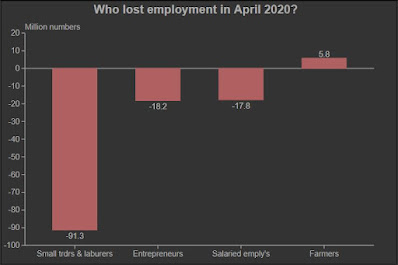India's Most Deprived: The Migrant Crisis
On the eve of 24th March 2020, Prime Minister Narendra Modi announced a nationwide lockdown for 21 days to tackle the ongoing COVID-19 pandemic. The very next day our country saw a very eerie atmosphere with all the non-essential services stopped the country came to a standstill and in the coming weeks saw a huge rise in people losing jobs. This situation hit hard on the common man but not more than what our migrant laborers faced, with their work stopped most of them lost their jobs and then began their worst nightmare.
Before we discuss this any further let us understand more about the current labor workforce in our country. According to the World Bank as of March 2020, the current labor force is at 494 million and most of them don't hold a regular job that comes with a written contract or regular payments into their bank account, or into their pension funds. To make matters worse presently there is no formal survey regarding the labor force and their numbers especially in the informal sector which accounts for more than 80% of our labor force. There were long-running surveys conducted by the NSSO called the employment-unemployment survey covering both the formal & informal sectors which have been discontinued by the present government. Hence the government has no idea how the decisions taken by them affected millions of migrant laborers.
Let us see how the decisions made by the current Modi Government affected millions of migrant workers:
1) It announced a nationwide lockdown with just 4 hours of notice
The government had enough time to prepare the country for an impending lockdown when the first case was detected on January 30 and even with the cases rising steadily the officials maintained a "not an emergency" stance.
2) The government did little for the stranded workers
Few weeks into the lockdown the stranded found themselves running out of money & food and with all the forms of public transport closed, they found it impossible to get to their home states and many of them walked a thousand miles with no food or water which led to many deaths.
Although the government asked the companies to pay their wages in advance, the government didn't account for the small cash reserves of small businesses.
3) Shramik trains fiasco and the punishing system
After five weeks of lockdown, the government announced special Shramik trains to send the migrants to their home state but left the entire process to the states who rarely spoke to each other which could have been averted if an inter-state council had been created. To add to their woes some states asked the workers to produce a medical certificate which they have to pay for declaring them asymptomatic and making the process online added to their woes and many workers had no smartphones and lacked vital information. The government didn't even bother to set up help desks, and the cherry on the cake was that they still had to pay for their fares even after the Modi government claimed that they would 85% of the fee which would come to about Rs. 4200 crore which could be covered under the PM-CARES fund.
3) Arrange transport for the stranded
Indian Railways is the world's 4th largest railway network which spreads over 95,000 km. With minimum support provided by the government before it went into lockdown, the laborers would have been able to travel to their home states with their own earnings, instead of the situation where millions are traveling by foot & are exposed to the disease along with the lack of medical support, food & water which would definitely harm more.
By following these steps the government could have managed this crisis much better than how it was managed.
Few weeks into the lockdown the stranded found themselves running out of money & food and with all the forms of public transport closed, they found it impossible to get to their home states and many of them walked a thousand miles with no food or water which led to many deaths.
Although the government asked the companies to pay their wages in advance, the government didn't account for the small cash reserves of small businesses.
3) Shramik trains fiasco and the punishing system
After five weeks of lockdown, the government announced special Shramik trains to send the migrants to their home state but left the entire process to the states who rarely spoke to each other which could have been averted if an inter-state council had been created. To add to their woes some states asked the workers to produce a medical certificate which they have to pay for declaring them asymptomatic and making the process online added to their woes and many workers had no smartphones and lacked vital information. The government didn't even bother to set up help desks, and the cherry on the cake was that they still had to pay for their fares even after the Modi government claimed that they would 85% of the fee which would come to about Rs. 4200 crore which could be covered under the PM-CARES fund.
The ones who were severely impacted by this sudden lockdown are our taxi drivers, construction workers, housemaids, factory laborers working across India's urban centers. This fiasco could have been averted had the government taken the right pre-emptive steps instead of turning it into India's worst humanitarian crisis.
Here are three ways India could have avoided this crisis:
1) Give ample notice to any economic lockdown
If these people had been given even a 5 to 7 days notice like that in Singapore, U.K, and New Zealand, migrant workers would have been able to make some arrangements following the social distancing protocol. This would also have prepared the manufacturing industries for an impending shut down of factories and carefully plan their resources.
2) Announced minimum wage support for the vulnerable
Like other countries, if India had deposited even Rs. 5000 per month 3 months in Jan Dhan Accounts the workers would have avoided migration and the total cost would be around Rs. 4.77 lakh crores which is much lesser than Rs. 20 lakh crores package. It could be reduced further to Rs. 1.72 lakh crore if each family was given Rs. 15000 per month for the above period.3) Arrange transport for the stranded
Indian Railways is the world's 4th largest railway network which spreads over 95,000 km. With minimum support provided by the government before it went into lockdown, the laborers would have been able to travel to their home states with their own earnings, instead of the situation where millions are traveling by foot & are exposed to the disease along with the lack of medical support, food & water which would definitely harm more.
By following these steps the government could have managed this crisis much better than how it was managed.


Comments
Post a Comment